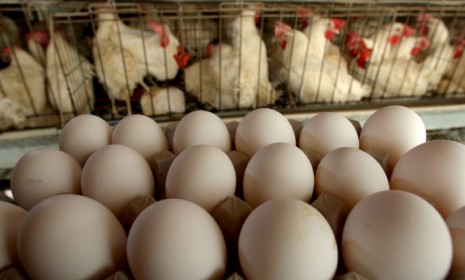Free-range eggs: Safer, or a waste of money?
A half billion eggs from factory farms have been recalled after a salmonella outbreak. Do consumers buy some insurance by paying more for free-range eggs?

A free daily email with the biggest news stories of the day – and the best features from TheWeek.com
You are now subscribed
Your newsletter sign-up was successful
With the largest egg recall in U.S. history fueling a nationwide salmonella scare, natural food advocates are stepping up their criticism of industrial farms. So far, a half billion eggs from two Iowa producers, Wright County Eggs and Hillandale Farms, have been recalled, and roughly 2,000 people have reportedly been stricken with salmonella between May and July. Since the recall, demand for relatively expensive free-range eggs has spiked. Are they really safer? (Watch a farmer discuss free-range eggs)
No question — free-range eggs are safer: Ninety percent of the eggs produced in the U.S. come from hens in "battery cages," which are so small the birds can't spread their wings, says Leigh Goessl at Helium. It's obvious that such cramped and dirty conditions, aside from being cruel, speed the spread of contamination. Cage-free, organic, and free-range eggs may not necessarily come from "ideal conditions," either, but "anything is probably better" than the factory-farm alternative.
"Why battery caged chickens can contribute to contaminated eggs"
The Week
Escape your echo chamber. Get the facts behind the news, plus analysis from multiple perspectives.

Sign up for The Week's Free Newsletters
From our morning news briefing to a weekly Good News Newsletter, get the best of The Week delivered directly to your inbox.
From our morning news briefing to a weekly Good News Newsletter, get the best of The Week delivered directly to your inbox.
Safety's actually better at industrial farms: All eggs — "big or small, cage, cage free, natural, organic, etc." — can get infected with salmonella, says veterinarian Craig Reed, as quoted by agribusiness newspaper Feedstuffs. If anything, food safety is strongest at big farms with large, automated cage systems, and strict sanitation rules. With the regimented, factory atmosphere, "there is not very much that's left to chance."
"Egg recall not a matter of size, cages"
Factory farms magnify the problem: There's a lot of "hype" on both sides, says Angela Wu at Newsweek, but the truth is salmonella outbreaks occur on big and small farms alike. Smaller free-range and organic farms may or may not be less likely to be hit by outbreaks — but when factory farms have a problem, it's "magnified," and can turn into a national crisis.
A free daily email with the biggest news stories of the day – and the best features from TheWeek.com